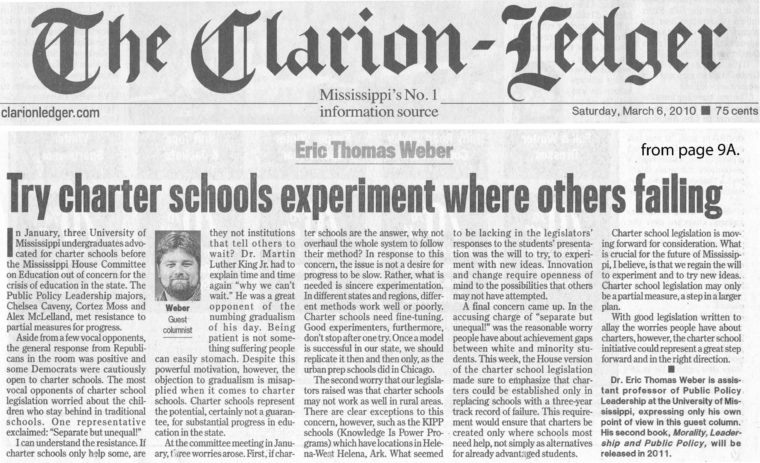Now that my new site is up, I’m slowly but surely adding to it the pieces I had up on my old site. This was my first op-ed published in The Clarion Ledger, published March 6, 2010, on 9A. I am grateful for permission to republish my pieces here and elsewhere.
Here’s a scan of the piece, though the character recognition in the file didn’t work well. Therefore, I’m posting here the text from the piece.
Try Charter Schools Experiment Where Others Failing
In January, three University of Mississippi undergraduates advocated for charter schools before the Mississippi House Committee on Education out of concern for the crisis of education in the state. The Public Policy Leadership majors, Chelsea Caveny, Cortez Moss, and Alex McLelland, met resistance to partial measures for progress.
Aside from a few vocal opponents, the general response from Republicans in the room was positive and some Democrats were cautiously open to charter schools. The most vocal opponents of charter school legislation worried about the children who stay behind in traditional schools. One representative exclaimed: “Separate but unequal!”

At the committee meeting in January, three worries arose. First, if charter schools are the answer, why not overhaul the whole system to follow their method? In response to this concern, the issue is not a desire for progress to be slow. Rather, what is needed is sincere experimentation. In different states and regions, different methods work well or poorly. Charter schools need fine-tuning. Good experimenters, furthermore, don’t stop after one try. Once a model is successful in our state, we should replicate it then and then only, as the urban prep schools did in Chicago.

A final concern came up. In the accusing charge of “separate but unequal!” was the reasonable worry people have about achievement gaps between white and minority students. This week, the House version of the charter school legislation made sure to emphasize that charters could be established only in replacing schools with a three-year track record of failure. This requirement would ensure that charters be created only where schools most need help, not simply as alternatives for already advantaged students.
Charter school legislation is moving forward for consideration. What is crucial for the future of Mississippi, I believe, is that we regain the will to experiment and to try new ideas. Charter school legislation may only be a partial measure, a step in a larger plan.
With good legislation written to allay the worries people have about charters, however, the charter school initiative could represent a great step forward and in the right direction.





 About Me
About Me